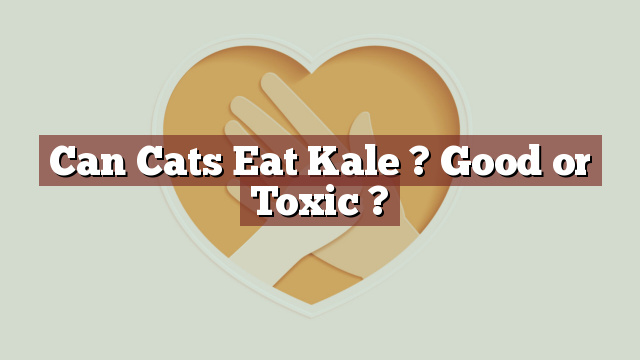Can Cats Eat Kale? Good or Toxic?
As pet owners, it is crucial to be aware of what foods are safe for our furry friends. Among the various human foods, kale has gained popularity in recent years due to its numerous health benefits. But is kale safe for cats to consume? In this article, we will explore the nutritional value of kale for cats, determine if kale is safe or toxic for them, discuss the potential risks and benefits of feeding kale to cats, and provide guidance on what to do if your cat consumes kale.
Nutritional Value of Kale for Cats
Kale is widely recognized as a superfood for humans because of its exceptional nutritional composition. It is packed with essential vitamins, minerals, and antioxidants. Kale is known to be a rich source of vitamin A, vitamin C, vitamin K, calcium, and potassium. Additionally, it contains fiber and is low in calories, making it an appealing choice for those looking to add a healthy ingredient to their diet.
Is Kale Safe or Toxic for Cats?
Can cats eat kale? The answer is yes, cats can eat kale in moderation. However, it is important to note that kale should not be a significant part of a cat’s diet. While the nutritional benefits of kale can be advantageous for humans, cats have different dietary requirements. Their bodies are designed to primarily consume meat-based diets, and their digestive systems may not efficiently process plant matter.
Potential Risks and Benefits of Feeding Kale to Cats
Feeding kale to cats should be approached with caution. Although it is generally considered safe in small quantities, kale can have some potential risks. One major concern is that kale contains compounds called oxalates, which can contribute to the formation of calcium oxalate stones in a cat’s urinary system. This can lead to urinary tract issues and discomfort for your feline companion.
On the other hand, there are potential benefits of incorporating kale into your cat’s diet. The high fiber content in kale can promote digestive health and help prevent constipation. The antioxidants present in kale may also support a strong immune system and overall well-being.
What to Do If Your Cat Eats Kale
If your cat accidentally consumes kale, there is usually no need to panic. However, it is important to monitor your cat for any adverse reactions. If your cat shows signs of gastrointestinal distress, such as vomiting or diarrhea, or if you suspect that a large amount of kale has been ingested, it is best to consult your veterinarian for guidance. They can assess your cat’s specific situation and advise you on the best course of action.
In Conclusion: Should Cats Eat Kale?
In conclusion, cats can eat kale in moderation, but it should not be a significant part of their diet. While kale offers nutritional benefits and can be safe for cats when given in small quantities, it is important to be aware of the potential risks associated with this leafy green. If you choose to introduce kale into your cat’s diet, it is crucial to do so gradually and monitor your cat’s response. As always, consulting with a veterinarian is recommended before making any significant changes to your cat’s diet to ensure their overall health and well-being.
Thank you for investing your time in exploring [page_title] on Can-Eat.org. Our goal is to provide readers like you with thorough and reliable information about various dietary topics. Each article, including [page_title], stems from diligent research and a passion for understanding the nuances of our food choices. We believe that knowledge is a vital step towards making informed and healthy decisions. However, while "[page_title]" sheds light on its specific topic, it's crucial to remember that everyone's body reacts differently to foods and dietary changes. What might be beneficial for one person could have different effects on another. Before you consider integrating suggestions or insights from "[page_title]" into your diet, it's always wise to consult with a nutritionist or healthcare professional. Their specialized knowledge ensures that you're making choices best suited to your individual health needs. As you navigate [page_title], be mindful of potential allergies, intolerances, or unique dietary requirements you may have. No singular article can capture the vast diversity of human health, and individualized guidance is invaluable. The content provided in [page_title] serves as a general guide. It is not, by any means, a substitute for personalized medical or nutritional advice. Your health should always be the top priority, and professional guidance is the best path forward. In your journey towards a balanced and nutritious lifestyle, we hope that [page_title] serves as a helpful stepping stone. Remember, informed decisions lead to healthier outcomes. Thank you for trusting Can-Eat.org. Continue exploring, learning, and prioritizing your health. Cheers to a well-informed and healthier future!

